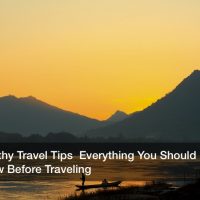
Since steam-powered trains developed in the 1800s allowing tourists to travel quickly and easily for the first time, the global travel industry has gotten enormous. If you’re excited about traveling this year, you’re not alone, but you should also strive to be cautious. Healthy travel tips are important to have no matter when you go on vacation, but in the wake of Covid-19, it’s even more critical that you have all the healthy travel tips you need to stay safe and healthy.
Whether you’re traveling with pets, with your friends, or alone, in this article we’ll tell you how to prepare for a safe, healthy trip, from keeping track of nearby urgent care centers to coping with jet lag. For all the healthy travel tips you need, keep reading.
Choose Your Destination Mindfully
If you’re one of the many people who’s been under quarantine for the past few months, chances are you’re restless and eager to get out of the house. While many places are lifting certain restrictions in spite of the pandemic, social distancing may still be mandated where you’re going, and you may be required to wear masks and even gloves to enter certain stores or gas stations. You can certainly travel safely in spite of the pandemic, but you should choose where to go cautiously, and take all the precautions you can to avoid contaminating yourself or others.

If an international excursion has been on your bucket list for a long time, this year might not be the best time to fulfill that dream. In the United States, the CDC has advised citizens to avoid all nonessential travel across national borders. Many countries around the world are implementing significant travel restrictions and regulations, so getting around in a new country could be difficult. Not only that, but in some parts of the world healthcare systems are overwhelmed, and unprepared to help a wave of visitors should they need medical care during their stay.
Wherever you choose to visit, make sure it’s a place that isn’t currently reeling from the effects of the pandemic. Even in the United States, certain parts of the country are having more trouble dealing with the virus than others, and these should probably be avoided for the time being. You should also get tested with a Covid-19 antibody test kit before going anywhere, just in case.
The rest of the healthy travel tips on our list will be more for general purpose travel. Just make sure to have plenty of masks, gloves, hand sanitizer, and tissues packed for your journey, wherever you travel to.
Buy Travel Insurance
Going anywhere that you’re not familiar with is risky, and that risk intensifies if the place is typically crowded or you stand out from the locals. Pickpockets are not uncommon in some parts of the world, and there’s always a chance that something you brought with you gets stolen. You’ll even put yourself at risk of bodily harm, any time you step out next to a highway or attempt an extreme sport. Going on vacation is also a financial risk since it involves buying services ahead of time that you could end up not using if something goes wrong, such as airport car service.
Because of this, it’s a good idea to buy travel insurance before heading out on a globe-trotting adventure. The purpose of travel insurance is primarily to safeguard your finances in case things don’t go as planned. Basically, if your vacation is unexpectedly cut short or canceled altogether, your insurance will step in to make sure it isn’t a total financial loss, reimbursing you for most services purchased.
Different policies have different terms, but they all provide either full or partial refunds after cancelations, as long as you cancel for certain reasons.
If you or your traveling partner get sick or injured right before you’re scheduled to leave, you will likely be reimbursed for your reservations and services. You should also be reimbursed if you’re forced to cancel or evacuate a destination because of weather, natural disasters, or terrorism.

Some less well-known incidents that can qualify you for an insurance claim are the loss of a job, a work transfer, having your home damaged or burglarized, and theft of passport or visa. You will probably also be covered if you have unexpected jury duty or court appearances.
You should familiarize yourself with your specific insurance policy to find out what incidents are covered, and under what conditions. While many people assume their policy will cover personal injuries or costs of an injury attorney, most often this is not the case. If you’re thinking you may be at risk of getting hurt on your vacation, such as by participating in some extreme sport, you should make sure you have good medical insurance as well as traveler’s insurance. Just be sure your policy will actually cover injuries sustained from practicing extreme sports. Personal injury law can be hard to understand if you’re not used to it. Good insurance is one of the most important healthy travel tips out there.
Always Know Where a Hospital or Urgent Care Is
Whether you’ve planned any death-defying sports experiences or not, you never know when someone in your group could be injured unexpectedly. Even something mild can become a serious headache if you don’t get the right medical care quickly. Noting the location of the nearest family urgent care, wherever you are, can really help when everyone is frantically reacting to an accident.
Keep Electronics to a Minimum
It can be tempting to bring along every camera accessory you can think of, but when it comes to electronics, less is often more. Unless you’re a professional photographer, you’ll probably feel bogged down by all that gear, and will resort to using your iPhone anyway. If you’re honest with yourself, you probably won’t really be doing any work on your laptop in your spare time, so you can safely leave that behind. After all, besides taking excellent photos, your smartphone can send emails and keep you connected to friends and family while you’re gone.
Hauling heavy electronics around doesn’t just slow you down. It also makes you an obvious target for would-be thieves wishing to snatch them up. Besides your phone, if you do bring any electronics, you should keep them locked in your car or the hotel room safe while you’re exploring. This is one of those healthy travel tips that’s more about basic convenience than health, but let’s face it: stress is bad for your health, too. Avoid it by leaving the digital clutter at home.
Avoid Travel Insomnia and Jet Lag

Nothing hampers a fun day on vacation like jet lag or insomnia. Even if you normally sleep soundly at home, your brain and body aren’t as likely to relax in a strange environment, making sleep difficult. Losing sleep doesn’t just make it hard to focus on the fun — it also puts you at a much higher risk of getting into trouble. You’ll be a more attractive target to crooks if you seem like you aren’t alert, and you’ll be more likely to trip, lose your footing, or walk into traffic too. And if you’re planning on driving, failing to get a good night’s sleep can literally make you a danger to everyone on the road.
To help yourself sleep at night in a new place, retreat to your hotel room at least an hour before you plan to fall asleep. Do some light reading, or watch television if you must, but be sure and turn it off a half hour before bed, or the bright light will prevent you from sleeping. Avoiding eating anything within two hours of going to bed. Finally, make sure the room you’re sleeping in is completely dark, and keep the temperature extra cool to encourage your body to sleep.
When you get up in the morning, you can take a hot shower to increase your body temperature and wake yourself up. Even though you’re on vacation, you might consider doing a quick calisthenics workout in your room before starting the day, as this really helps you wake up.
If your travel destination is in a time zone very different from yours, jet lag could be a problem, even if you’re taking a car or bus to get there. To minimize the effects of jet lag, begin to adjust your sleeping schedule to that of the new location before you leave home. However, if you’re only going to be somewhere for two days or fewer, you should do the opposite, trying to keep your sleep schedule roughly the same as it is at home. If you’re only going to be somewhere for a couple of days, then you’ll need to come home again by the time you finally convert your body to the new time zone.
Another of our healthy travel tips that applies to sleeping is to take melatonin to help you sleep. Melatonin is a hormone that helps you sleep, and it typically rises naturally about two hours before your usual bedtime. Your body might need a little nudge while you’re traveling, so you can take some an hour or two before bed.
As a side note, over-the-counter sleeping drugs aren’t usually recommended with healthy travel tips. Most sleeping medications have a long half-life, which means they linger for a long time in the body. So while you might sleep well, you’ll likely also feel groggy the next day, which defeats the purpose of getting good sleep anyway.
Travel Smart With Pets
An entirely separate list of healthy travel tips apply to traveling with pets. For starters, you should be sure and visit your local veterinary services for a checkup before taking your pet on any adventures. You want to make sure they’re in perfect health before the trip.
If you’re traveling by car, know that the safest way for your pet to ride is in a special carrier that’s been anchored to a rear seat. Dog restraints are popular, but while they can prevent your pet from roaming around the car, they offer little protection to your dog in the event of a crash. It’s important to give your pet plenty of rest stops along the way. It’s also a good idea to bring another at least one human to help you care for the pet. Traveling with a dog isn’t always the most convenient choice, since many public places don’t allow animals inside, so it helps to have another person with you.
If you’re traveling by airplane, keep in mind that air travel can be risky for pets. You should, first of all, ensure that your pet isn’t one of the breeds that’s particularly susceptible to injury from flying, due to air deprivation and heat. If you still opt to fly with your pet, do everything you can to bring them with you into the cabin, rather than sending them with the baggage. You’ll need to check the airline’s guidelines to find out if a special carrier is required to bring your dog in the cabin.
Get a Checkup Before You Leave
Obviously you’ll need to visit walk in clinics or your personal doctor for a Covid-19 test, but even under normal circumstances, you should consider getting a checkup before traveling. If you have an ongoing medical condition and require specialized care from cardiologists or gastrointestinal doctors, you might need to meet with them before leaving on vacation.

One of the best things about our modern world is the ease with which we can contact our friends, loved ones, and healthcare services. If your local clinic offers a virtual doctor service, you might want to find out how you can take advantage of it, just in case you need convenient medical advice while you’re away. Having this option can make you feel a lot safer and more prepared on the go, as well as more connected to home.
And there you have it: our top healthy travel tips for staying safe and well while you’re on vacation. Hopefully, this article has been helpful to you as you plan your trip.



